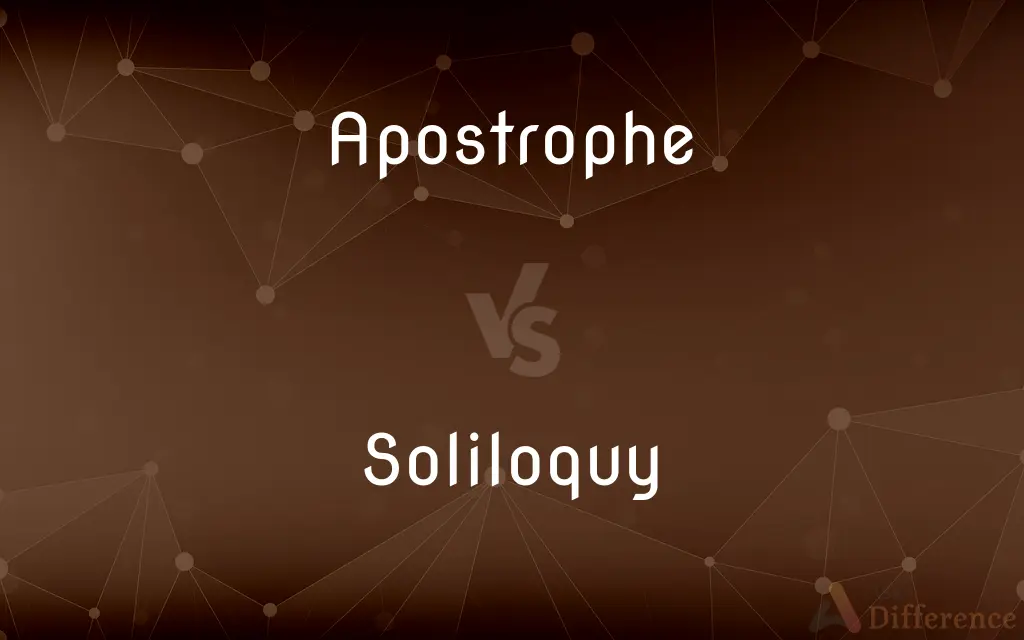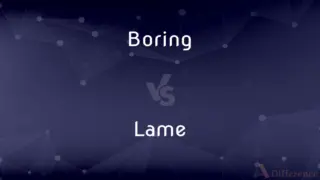Apostrophe vs. Soliloquy — What's the Difference?

Difference Between Apostrophe and Soliloquy
ADVERTISEMENT
Compare with Definitions
Apostrophe
The direct address of an absent or imaginary person or of a personified abstraction, especially as a digression in the course of a speech or composition.
Soliloquy
An act of speaking one's thoughts aloud when by oneself or regardless of any hearers, especially by a character in a play
He did most of his thinking by soliloquy
Edmund ends the scene as he had begun it, with a soliloquy
Apostrophe
The apostrophe (' or ’) is a punctuation mark, and sometimes a diacritical mark, in languages that use the Latin alphabet and some other alphabets. In English, it is used for four purposes: The marking of the omission of one or more letters, e.g.
Soliloquy
A soliloquy (, from Latin solo "to oneself" + loquor "I talk", plural soliloquies) is a monologue addressed to oneself, thoughts spoken out loud without addressing another.Soliloquies are used as a device in drama to let a character make their thoughts known to the audience, address it directly or take it into their confidence. English Renaissance drama used soliloquies to great effect, such as in the soliloquy "To be, or not to be", the centerpiece of Shakespeare's Hamlet.
Apostrophe
The superscript sign ( ' ), usually used to indicate the omission of a letter or letters from a word, the possessive case, or the plurals of numbers, letters, and abbreviations.
ADVERTISEMENT
Soliloquy
A monologue, especially in a play, that is delivered by a character who is alone or unaware of the presence of other characters and that reveals the thoughts or feelings of that character.
Apostrophe
(orthography) The text character ’, which serves as a punctuation mark in various languages and as a diacritical mark in certain rare contexts.
Soliloquy
The act of speaking to oneself.
Apostrophe
(rhetoric) A sudden exclamatory piece of dialogue addressed to someone or something, especially absent.
Soliloquy
(drama) The act of a character speaking to themselves so as to reveal their thoughts to the audience.
At the end of the second act the main villain gave a soliloquy detailing his plans to attack the protagonist.
Apostrophe
A figure of speech by which the orator or writer suddenly breaks off from the previous method of his discourse, and addresses, in the second person, some person or thing, absent or present; as, Milton's apostrophe to Light at the beginning of the third book of "Paradise Lost."
Soliloquy
(authorship) A speech or written discourse in this form.
Apostrophe
The contraction of a word by the omission of a letter or letters, which omission is marked by the character ['] placed where the letter or letters would have been; as, call'd for called.
Soliloquy
To issue a soliloquy.
Apostrophe
The mark ['] used to denote that a word is contracted (as in ne'er for never, can't for can not), and as a sign of the possessive, singular and plural; as, a boy's hat, boys' hats. In the latter use it originally marked the omission of the letter e.
Soliloquy
The act of talking to one's self; a discourse made by one in solitude to one's self; monologue.
Lovers are always allowed the comfort of soliloquy.
Apostrophe
Address to an absent or imaginary person
Soliloquy
A written composition, reciting what it is supposed a person says to himself.
The whole poem is a soliloquy.
Apostrophe
The mark (') used to indicate the omission of one or more letters from a printed word
Soliloquy
Speech you make to yourself
Soliloquy
A (usually long) dramatic speech intended to give the illusion of unspoken reflections
Share Your Discovery

Previous Comparison
Boring vs. Lame
Next Comparison
Coxswain vs. Pilot













































